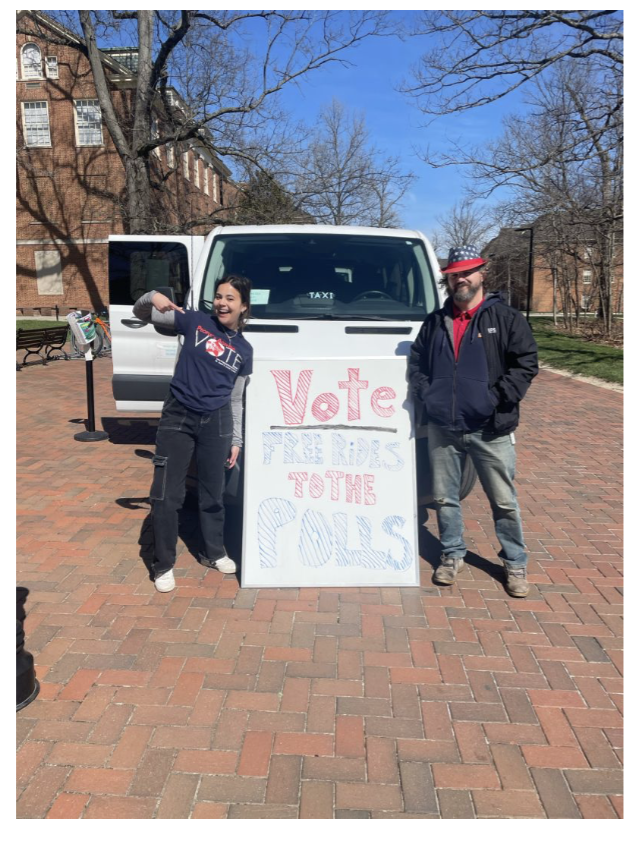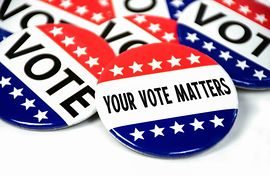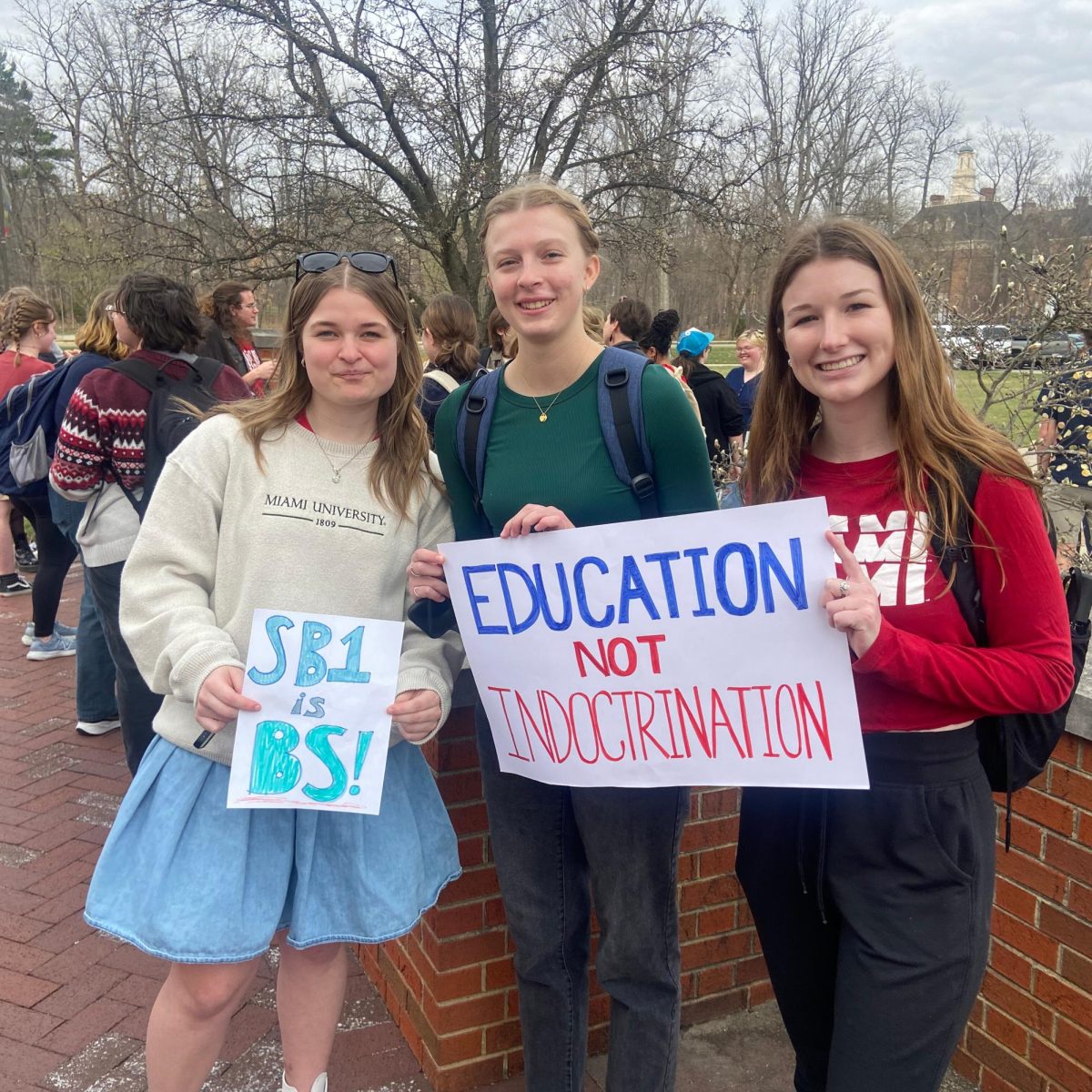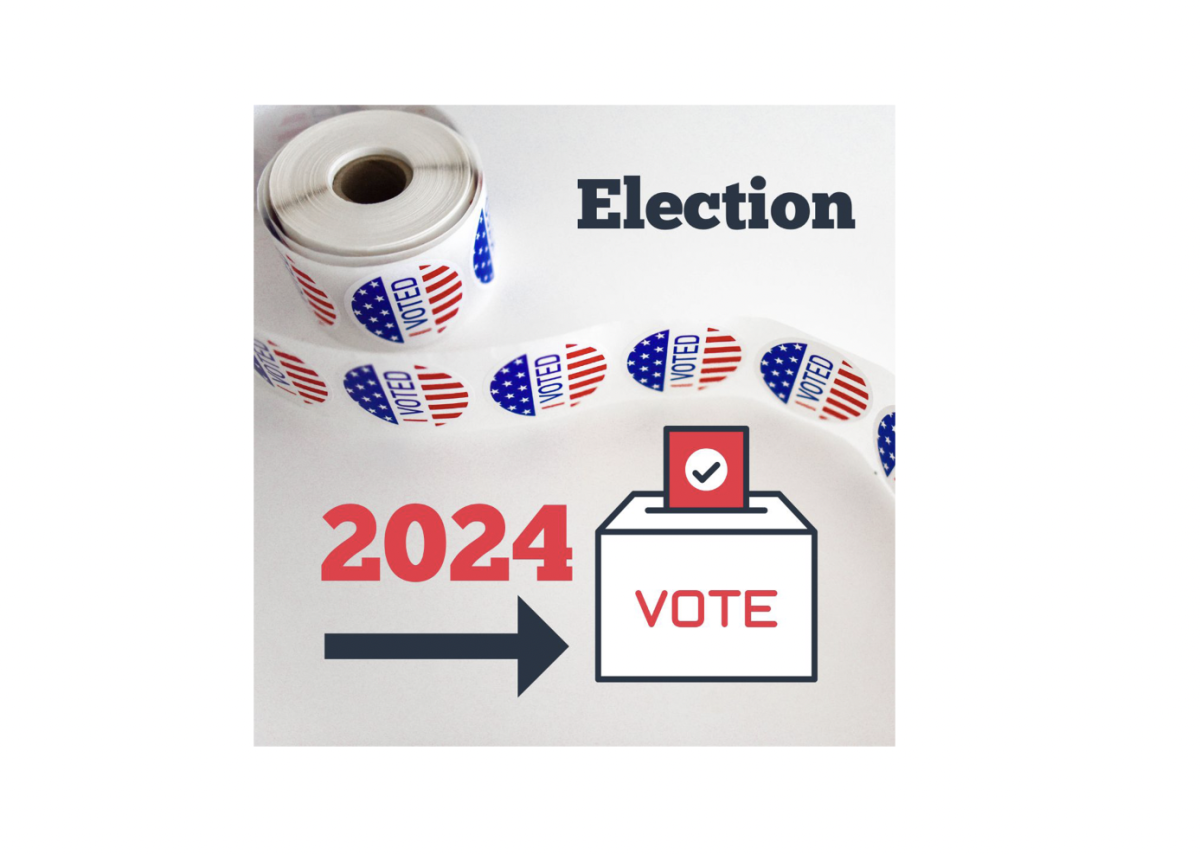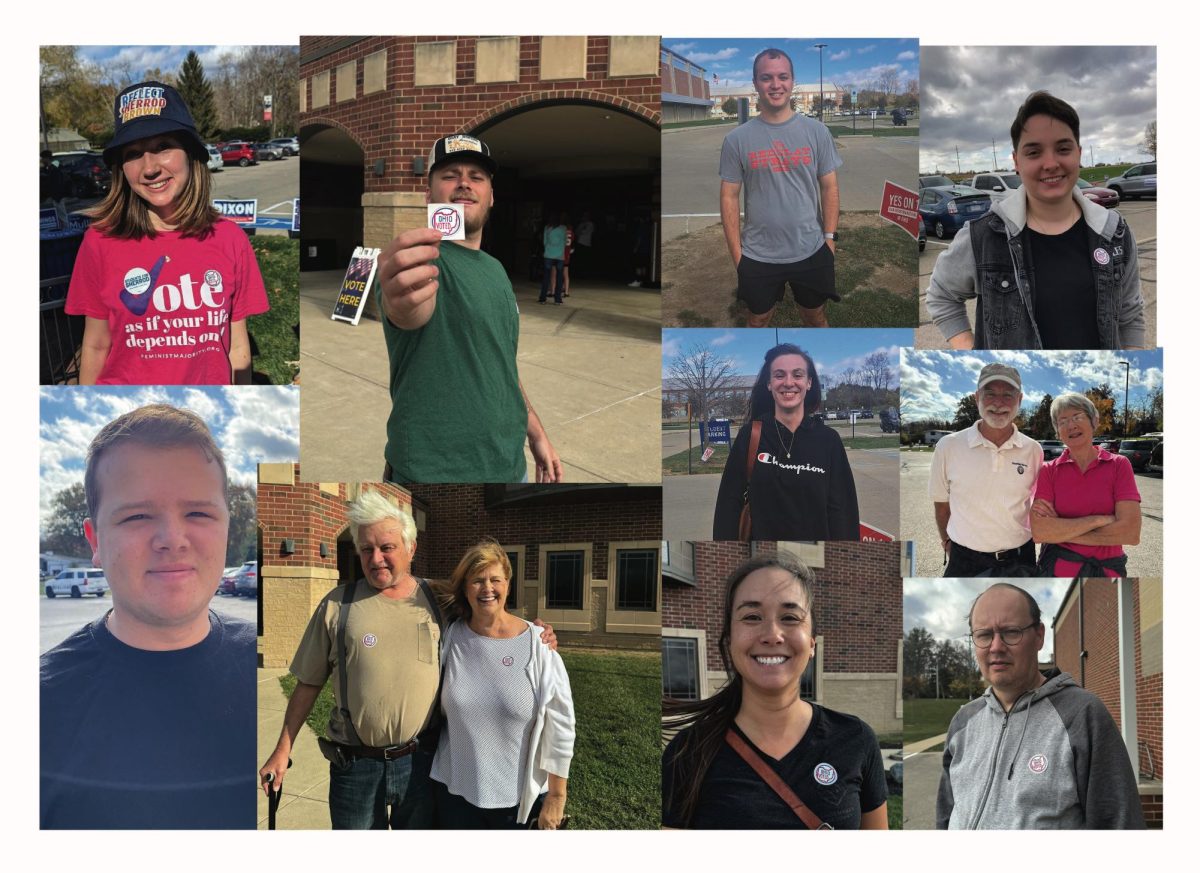Encouraging people to vote
Over the past few months, Mollie Duffy has memorized the pitch she gives students. She hands out absentee ballot request forms, stamps and envelopes to a group in front of her table. She helps the next student check their voter registration online. Duffy is quick to answer any questions and refers people to resources to answer the ones she doesn’t know. Duffy can’t recall the exact number of people she’s talked to so far.
“There’s been at least eight groups,” she said. “At least 300 people have probably heard my spiel. In terms of tabling, maybe 600 students or more have stopped to talk.”
The accounts she posts her online campaigns on have over 12,000 combined followers. She labels herself a “voting rights activist.” Duffy spent her summer interning with the Democratic National Convention. These days, she’s the secretary for governmental relations in Miami’s Associated Student Government. Duffy’s committee helped to educate students on voting practices, registration and finding resources. Her Democracy Bus initiative helps students get to the polls on Election Day.
“When you’re just turning 18, you don’t necessarily have a routine or a process or the knowledge about the election process since it’s so complicated to kind of figure out,” Duffy said. “The main goal is to help people get into the habit of voting because it is so critical to upkeeping our democracy and participating and being a citizen of this country.”
She doesn’t talk about abortion or gerrymandering or immigration – just about voting. Duffy wishes more young people would vote. Among younger voters ages 18-29, registration is down 10% from the 2020 election in Ohio, according to research by Tufts University.
“If more young people vote, our politicians would care more about young people’s issues,” Duffy said.
Duffy has kept her focus in mind as she helps students send last-minute absentee ballots. She jots down the information for the Democracy Bus to pass to another student. Until Nov. 5, this is her goal and she plans to stick to it.
–-Riley Crabtree
Social media bias for young voters
Ella Guehl is a recent Miami University graduate. At age 22, she still lives near Oxford and works for Fridge & Pantry and Brick Street. She is active on social media and has marketed for numerous brands. However, Guehl said social media does not give citizens the information they need to form their own political opinions.

“It is very biased,” said Guehl. “Social media is stupid and people shouldn’t be getting their facts from social media.”
Guehl said she feels a sense of division among their peers because of political
affiliation. Young voters feel like they should not take their political ideology to social media platforms for fear of upsetting people according to Guehl.
“Social media has become a toxic place,” said Guehl. “I feel like many people have forgotten that one of America’s values is the freedom of speech and expression and that we are all entitled to our own views and opinions. People have become too soft.”
–Hailey Craver
Representing Republicans on campus
Leading up to the Nov. 5 election, Victoria Rivas feels like a minority on a college campus.
The junior public administration major is communications director for Miami’s College Republican.
“I feel like a double minority because I’m a first gen and a College Republican,” Rivas said. Despite this feeling, she is excited to find more people who hold similar beliefs on campus than she realized.

“I have people come up to me or text me and thank me for speaking out in class and they say that I’m so brave,” Rivas said. “The fact that so many people have to congratulate me for saying what I believe, which is a right we have, is crazy.”
Amid the heavy campaigning efforts across campus by Democrats advocating for Sherrod Brown and others, Rivas said it’s important for Republicans to voice their opinions too.
“It’s weird to voice my opinions … I feel like I get a lot of judging looks for them,” Rivas said.
Rivas said most people who interact with College Republicans are already registered to vote. However, the club did focus on outreach to Greek organizations by offering nonpartisan guidance on how to register to vote.
“I think most of us are excited, and I know we were very hopeful earlier this year, and then obviously they had a new candidate come in for the Democratic Party,” Rivas said. “I think after the first debate a lot of us …we lost a little bit of our hope and excitement.”
Despite Trump’s debate performance, Republicans are still determined to keep pushing to get out the vote.
“I know a lot of people that love Trump, in our club, and I know people that absolutely don’t like him, and it’s kind of just seeing us all come together and push through as the election gets closer,” Rivas said.
Rivas and other members of College Republicans have watched as people have begun vocalizing their support for Trump and the Republican party who haven’t been vocal in the past. She is confident that college students will vote with their pocketbooks. She said she sees the economy as the most important issue.
“I think it’s important to know that what the election is about this year is really voting policy, not people,” Rivas said. “I think that’s something everyone should think of when they cast their ballots this year.”
–Sophia Mathur
Fighting for young Democrats
Miami’s College Democrats chapter has bounced back after COVID with the help of College Democrats President Patrick Houlihan.
Houlihan, also the president of College Democrats Ohio and the Northwest regional chair for the Butler County Democratic Party said he and the executive board at the time built a foundation for future generations.
“Through the work across the state, we’re starting to get the Ohio Democratic Party to pay attention to college students a lot more and lean into activism on our campuses,” Houlihan said.
Houlihan said he’s been able to work with people at the state level to bring resources and information from them down to the local chapters and vice versa.
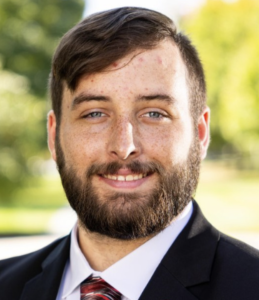
“Students have a big say,” Houlihan said. “As young people get more and more involved in their
communities, in the structures around them, they have important voices. As a college student who shows up in rooms in Hamilton and is the youngest person there by 20 years, people will listen to the young perspective, and they are listening to the young perspective.”
Specifically at Miami, Houlihan said the accomplishments have been vast. The Democratic party volunteers on campus worked to register more than 490 students on campus.
“Getting students registered to vote is the first step, though,” Houlihan said. “Getting them to go vote is the next. … If we can get 500 voter registrations at Miami University. Can you imagine what’s going on at Ohio State?”
–Taylor Stumbaugh
Seeking out responsible journalism
Anyone paying attention to the news knows this presidential election between Kamala Harris and Donald Trump is “the biggest election of our lives.”
However, with disinformation taking over social media platforms, the importance of true, responsible journalism is at an all-time high. Rosemary Pennington is the chair of the Department of Media, Journalism & Film at Miami and she’s an associate professor of journalism. Pennington, an Oxford resident, focuses a great deal on politics. One area of concern was the attacks on news media by Trump and his campaign since 2016’s election cycle. Despite the fewer attacks on media outlets, an assortment of lies were told about different communities like the Haitian immigrants in Springfield, Ohio.
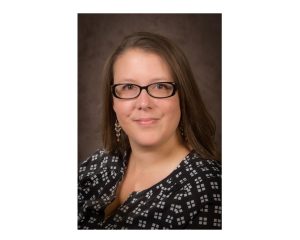
“Especially post-Jan. 6, [there is] that specter of violence that kind of is hanging over everything,” Pennington said. “What was happening in Springfield after they made those claims that the immigrants were eating pets was a real drain on that society. Having a town essentially shut down, schools and city offices facing bomb threats because of something a candidate for an office said, that just feels really, really hard.”
Pennington uses her journalism background to sift through the information presented to her. She wants to find the right candidate to hold the highest office in the United States of America, and that means searching through policies, their press appearances and their responses to questions.
Her experience covering congressional races in Alabama early on in her journalism career provided her insight into what values she holds dearest in candidates: Ensuring they’re telling the truth and how they treat journalists.
“Watching the news coverage and the treatment of news media has made the last two election cycles really tough to figure out, ‘How do I teach students how to operate in this manner?’” Pennington said. “It’s hard to critique journalists when they are in a situation where it’s really difficult to do the reporting they need to do.”
It’s important to understand where to find good sources and figure out whom to trust and who not to. Pennington is trying to instill that in her students.
–Jeffrey Middleton
Deciding on what future should be
From the bus stop to the ballot box, she moves with a purpose, informed and prepared to make a vital decision.
Kennedy Monroe, a Miami University Sophomore, BSAA Treasurer (Black Student Action Association) and AKA (Alpha Kappa Alpha) sorority member, plans to vote in her first presidential general election. She already voted in the primary. Monroe said the most important issues she considers are foreign policy, previous political history, economy, national unity, the strength of the figure and generally aligned beliefs or values. In this election, she will vote as an independent, tired of the divisiveness and hopes more people will be open to discussion, rather than the name calling.
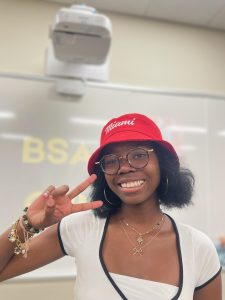
“I don’t like that the media pushes out so many extreme views,” Monroe said.
While she is still a new voter, she said she is well informed, consuming news from local and bipartisan media around 10 times daily.
“I find that local news stations have less bias in them,” Monroe said.
She is passionate about her choices and cares for policies and specifics above all else, unafraid to inform friends and family of her stances.
“If they [family and friends] say something crazy, I will just tell them, ‘Look into this if you are considering that,’” Monroe said. “I’ve done that.
“I feel like everything is so much more complicated, and everyone really needs to take a deep dive into what they want the future to be.”
–Vitto Salotto
Rhetoric in politics
“You’re always going to have rhetoric with politics,” said Jon Rutter, assistant teaching professor of strategic communication at Miami University. “That’s just part of the game.”
What exactly does rhetoric mean in the context of politics, and the upcoming presidential
election?

In campaign politics, rhetoric revolves around convincing individuals to vote for a specific candidate.
“They’re not trying to govern,” said Rutter. “They’re just trying to get votes. And so, often, you throw truth out the window.”
“But as Plato conceived rhetoric, … what is really important … is some understanding of what the truth is. … And you got to know something about the soul of your audience so that you can bring the truth to them,” said Rutter.
Since Vice President Kamala Harris entered the presidential race in July, she has been “able to articulate a vision,” said Rutter, that “[President] Biden simply could not do” based on his performance at previous presidential debates.
In contrast, former President Donald Trump excels in applying pathos within his political rhetoric.
“What Trump is good at,” said Rutter, “is understanding his audience and being able to tap into their emotional cravings.”
“You’re always going to have rhetoric with politics,” said Rutter. “That’s part of the game.”
–Hannah Sander
Hiding views to not impact job search
‘Scared’ is the word Amelia Major used for this upcoming election. To her, this election is extremely important because this is the world she is entering. The world she will work in.
The world she will start thinking about children and her future. Major, a senior studying global diplomacy and strategic communications, already used her right to vote in this upcoming election and said in this election specifically every vote counts.
“I see this election being very, very close in terms of votes, that’s why it’s so important for people to get out and vote,” said Major, a Maryland resident who voted during a recent trip home.
Growing up, her parents emphasized being educated in terms of politics and encouraged her to always utilize her right to vote. Because of this, Major gets very upset when she hears about people not voting.
“When I found out people are not voting it’s either a sign of ignorance or privilege,” she said. “I think some people don’t fully understand the gravity of this election and potential side effects that can impact everybody.”

Major said she believes the younger generation isn’t taking this election seriously although it’s the world they will be entering.
“I think it’s foolish when I hear my friends talk about not using their right to vote. Especially because I feel like each candidate is doing a good job of touching on issues pertaining to young adults.”
Although Major is passionate about politics, she hinders herself from expressing her views on social media. She is looking for a job in public relations and the government and fears her political stance could impact her ability to get a job.
“I’m not ashamed of my political stance, but it’s not something I want the entire world to know,” said Major.
Major also strays away from wearing her political views on her sleeve although she’s extremely passionate about politics.
“I’m not going to lie, I have photos up in my room of the candidate I’m voting for and have ordered their merchandise. But you will never see me walking around campus wearing my political views,” said Major.
–Avery Seesz
First-time voter excited about milestone
Myron Barker Jr., a 19-year-old sophomore at Miami University studying sports communication and media will vote for the first time this election. He is excited to make his voice heard as an adult.
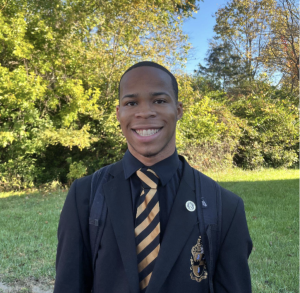
“This is another significant milestone in my life,” he said. “ I’m getting older, and I’m getting the ability to do more things and put my voice out there.”
Voting for the first time can feel intimidating. The process of registering to vote and researching candidates and issues might seem overwhelming. Barker said registering was the easy part.
“Registering to vote was really easy, but preparing to cast my ballot for the first time was nerve- wracking,” he said. “I really want to make sure that I make the right decision, and with this being my first time, I just don’t want to do anything stupid.”
Barker said this part of the process required a significant change to his lifestyle.
“I’ve watched more debates and looked at the news more frequently,” he said. “Before, I would just look at the news occasionally, watch a little bit of the debate, and go on with my life. Now that I am focused and paying attention, I feel more comfortable that I can come to a confident and concrete decision.”
The right to vote is exciting for most, but not for all. According to the Pew Research Center, about two-thirds of the voting-eligible population turned out for the 2020 presidential election, the highest rate for any national election since 1900. One-third of the voter-eligible population, about 56 million people, didn’t vote. With a lot at stake in this election, Barker urges citizens in the United States who are eligible to vote to exercise their civic duty.
“There were some groups in this country that had to wait a long time and fight for the right to vote,” he said. “I would enthusiastically push people to vote. I’ve always been taught that everybody’s vote matters and that you should use your vote.”
–Ian Enders
These voter profiles were written by Sacha DeVroomen Bellman’s feature writing students at Miami University.


